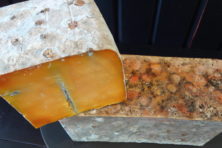The Cheese Insider
- Share
- Tweet
- Pin
- Share
The two main enemies of cheese are excessive heat and air. Heat makes it deteriorate rapidly. Leaving it open to air will dry it out and leave it prey to the bacteria that cause mold.
At our cheese shop we sell cheeses in three different formats; cheese that we buy pre-cut and pre-wrapped by the cheesemaker, cheese that we cut off the wheel and wrap in a special cheese film that has tiny perforations that allow it to breathe, or cut off the wheel and wrapped in special French cheese paper.
The ideal conditions that we store our cheeses are found in most good cheese shops, cool and slightly humid. Once you get the cheese home your refrigerator is your best choice. I recommend that you store your cheese in a warmer spot in the refrigerator, which is usually a drawer that is just a bit warmer than the rest of the unit.
You need to wrap the cheese properly. The very best method is to use cheese paper, which most cheese shops, including ours, sell. If you have to remove the cheese that has been vacuum packed or have to re-wrap the cheese, waxed paper or foil is generally better that plastic wrap, which can make the cheese moist and sweaty. However, plastic wrap is an acceptable way of wrapping blue cheeses and harder cheeses. Beware of putting cheese together in a plastic container since milder cheeses may pick up flavors from stronger ones.
It’s advisable not to keep cheeses too long once you cut into them. That is why often recommend to our customers that it is always best to buy smaller amounts of cheese and buy them more often. Softer cheeses and those that have already been matured by the cheesemaker or by us in the shop will deteriorate faster than the harder ones, and should ideally be consumed within a few days. If you keep them for longer, re-wrap them regularly.
Another question we get asked is, “Can you freeze cheese?”
Purists say no, but if you have more cheese left over than you are able to eat immediately, it makes sense, though be prepared for a loss of quality. Harder cheeses generally do much better when they are frozen than softer ones. Grating the cheese before you freeze it will also help in making it easier to use later. When we have too much of a good hard cheese, Janice will grate it, freeze it, and then use mostly in cooking.
Source: CHEESE, by Fiona Beckett



